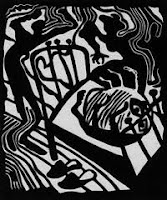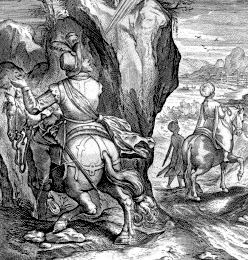I’m blessed with two daughters. One has light hair, the other dark. One has Kathy’s blue eyes, the other my brown eyes. Like two seeds that fall adjacent to each other on the ground and germinate, they grow with their roots intertwined, but the each grows toward the light their own way, branches often in opposing directions. Their comments on Saturday’s posting (We Cannot Jump Off Our Own Shadow) share two perspectives worth a look. Amy looks at the turning, and the stillness within it, referring to T.S. Eliot’s Quartets, specifically “Burnt Norton”. Margie points out that the very existence of a shadow is evidence of light. Remember making shadow puppets on the wall? Remember how you could make them bigger by moving closer to the light?
In any real life, we will be turned around. Will we feel for the stillness in which we are rooted, and know our stability, our source?
When we face nothing but darkness, will we understand that the largest shadow is cast by the nearest light? I pray for these two gifts for all of us – for the sense of stillness in our center, undisturbed by turning; for the sure knowledge of the light, and its closeness in the darkest times.
When we face nothing but darkness, will we understand that the largest shadow is cast by the nearest light? I pray for these two gifts for all of us – for the sense of stillness in our center, undisturbed by turning; for the sure knowledge of the light, and its closeness in the darkest times.
Thanks, my two bright girls.






























